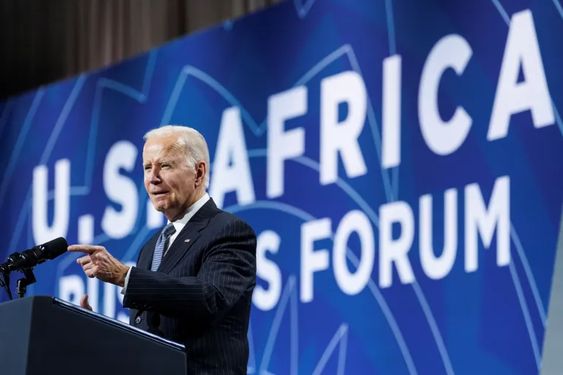Africa
Summit of 50 African delegations, Biden boasts about billions in US-African deals

At a summit of 50 African delegations, Biden boasts about billions in US-African deals.
At a leadership summit, Biden advocates relationships with Africa.
When he talks about new investments and trade deals in Africa, the US president talks about renewable energy and infrastructure.
As the United States looks to forge closer ties and boost commerce with states all over the continent, President Joe Biden has emphasized the necessity for balanced alliances with African countries.
At the US-Africa Leaders Summit’s inaugural trade roundtable on Wednesday in Washington, Biden said the discussions were about “creating ties” as well as a “shared future” for the US and Africa.
Biden told the group of political and business leaders, “We’ve recognized for a long time that Africa’s development and prosperity are important to securing a better future for all of us.”
In order to generate shared prosperity, he emphasized that collaborations should be on an equal footing rather than “create political obligation or encourage reliance.”
“The United States succeeds when Africa succeeds.” “Truthfully, the entire world does well,” he said.
The three-day summit in the US capital was attended by representatives from 49 African nations as well as the African Union; it was a follow-up to the first such event, which took place eight years ago under President Barack Obama.
The discussions take place as Biden works to mend US relations with other countries after four years of Donald Trump’s “America First” foreign policy.
The battle between Washington and Beijing, which has invested significantly more in Africa recently than the US has, has hung over this week’s deliberations.
However, in their efforts to strengthen connections with African nations, Biden administration officials have sought to minimize that aspect, emphasizing instead that the summit “is anchored in the awareness that Africa is playing a significant geopolitical role.”
In response to the talks, China said that the US should “respect the choice of the African people and make concrete efforts to support Africa’s development instead of constantly smearing and insulting other countries,” according to Wang Wenbin, a spokesperson for the foreign ministry.
Wang said during a briefing that “Africa is not a place for great powers to fight or a target for random coercion by certain nations or people,” and that it is the “shared responsibility of the international community” to help Africa grow.
The US is concerned “about the effect that China and Russia have been able to create [in Africa] in recent years, particularly under the previous administration of Donald Trump,” according to Al Jazeera’s Kimberly Halkett, who was reporting from the White House on Wednesday afternoon.
According to Halkett, Biden is also “damage control” after Trump referred to African countries as “s**thole countries” while in power, igniting a global outcry. In these situations, some mending needs to be done, she noted.
The US promises increased investment.
According to US National Security Advisor Jake Sullivan, the Biden administration has announced a number of commitments to increase engagement with Africa over the past several days, including a planned $55 billion commitment over the next three years.
Washington revealed on Wednesday that it had made “two-way trade and investment commitments, treaties, and partnerships” worth more than $15 billion with Africa, especially on crucial topics like sustainable energy and infrastructure.
In addition, the US and the Secretariat of the African Continental Free Trade Area (AfCFTA) signed a Memorandum of Understanding, which according to the White House will open a $3.4 trillion market across the continent.
In his speech on Wednesday, Biden said, “Trade depends on reliable infrastructure to enable and protect resilient supply chains. Upgrading Africa’s infrastructure is key to our goal of building a stronger global economy.”
He also mentioned the businesses that had already closed deals at the summit, such as Cisco Systems and General Electric.
In order to benefit from Africa’s abundant natural resources and youthful population, African leaders had sought increased investment from US businesses and organizations.
Kenyan President William Ruto suggested that the US look for opportunities to invest rather than export goods. They are capable of producing for the African continent because they have the tools and the know-how.
Ruto said that US money can help fill the physical infrastructure gap on the continent to spur growth, citing predictions that the continent’s agribusiness sector will more than triple to $1 trillion by 2030.
discussions on elections and conflict zones
Later on Wednesday, Biden will meet with a few African presidents whose nations will hold elections in 2023. This will be followed by a dinner at the White House for all the presidents and their spouses.
On the sidelines of the summit, US Secretary of State Antony Blinken met with African heads of state for bilateral talks. The focus of these talks was on trying to solve conflicts and political tensions.
When he met with Tunisian President Kais Saied on Wednesday, Blinken stressed the need for “free and fair” elections this month as well as “comprehensive changes to strengthen democratic checks and balances and the protection of fundamental freedoms.”
US lawmakers and civil rights groups have asked the Biden administration to put pressure on Saied to stop what they call the North African country’s “democratic backsliding.”
In talks with Prime Minister Abiy Ahmed on Tuesday, Blinken also praised a cease-fire deal for Ethiopia’s troubled northern Tigray region that was reached in November.
According to a readout of the discussion with Abiy, “the secretary advocated expedited implementation of the agreement and access to the combat zones by international human rights monitors.”
The urgent need for all Eritrean forces to depart Ethiopia was also brought up during the conversation between Secretary Blinken and the Prime Minister. This is to occur simultaneously with the disarmament of Tigrayan combatants.
RESOURCES: NEWSPAPERS AND AL JAZEERA
